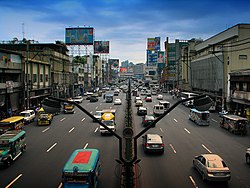Quiapo, Manila
Quiapo | |
|---|---|
 Quezon Boulevard near Quiapo Church | |
 | |
| Country | Philippines |
| Region | National Capital Region |
| City | Manila |
| Congressional districts | Part of the 3rd district of Manila |
| Barangays | 16 |
| Population (2007[1]) | |
| • Total | 23,138 |

Façade of the Minor Basilica of the Black Nazarene

Basilica of San Sebastian

Manila Golden Mosque
Quiapo is a district of Manila, Philippines. It derives its name from the water cabbage (Pistia stratiotes), which is named quiapo or kiapo in the Tagalog language. Referred to as the "Old Downtown of Manila", Quiapo is home to the Quiapo Church, where the feast of the Black Nazarene is held with millions of people attending annually. Quiapo has also made a name for itself as a place for marketplace bargain hunting.
Plaza Miranda, in the heart of the Quiapo district, is a town square named after Jose Sandino y Miranda, who served as secretary of the treasury of the Philippines from 1853 to 1863.[2] It is located in front of the Quiapo Church, and has become a popular site for political rallies. On August 21, 1971, while the Liberal Party held its miting de avance in the plaza, a bomb exploded, killing nine and injuring almost 100 civilians.
The Quiapo district is also home to a sizable Muslim population. The Golden Mosque and Green Mosque are located here.
Stores offering herbal products, and a large population of self-described fortune tellers, surround the Quiapo church. Thievery and sales of illegally copied media[3][4] are prevalent in the district.
In recent years, the local government of Manila, spearheaded by then-Mayor Lito Atienza, launched the Buhayin ang Maynila ("Revitalize Manila") project which greatly rehabilitated Quiapo and its vicinities, most especially Plaza Miranda, Quinta Market, the Arsenio Lacson Underpass and the University Belt. Parts of Rizal Avenue, starting from Carriedo Street to Recto Avenue, were converted into pedestrian shopping arcades.
Quiapo is geographically located at the very center of the city of Manila. It is bounded by the Pasig River and Estero de San Miguel to the south, San Miguel to the east, Recto Avenue to the north and Rizal Avenue to the west.
Contents
1 History
2 Barangays
3 See also
4 References
5 External links
History
Since the American insular government and commonwealth periods through to the late 1970s, Quiapo shared its status as the center of the activities of Manila's social elites as well as trade, fashion, art and higher learning with its surrounding vicinity (Avenida Rizal, Santa Cruz, Escolta and the University Belt). However, with the construction of the Manila Light Rail Transit System's LRT-1 spanning over Rizal Avenue, the occlusion of light, the trapping of smog and vehicle emissions left the streets beneath dark, gloomy and with an increase in crime and transients. Consequently, many long-time establishments vacated the area. Following the People Power Revolution in 1986, the vibrancy of Quiapo further diminished, with the void filled by makeshift markets to accommodate visitors to the Quiapo Church.
Barangays
Quiapo contains 16 barangays: Barangay 306 to 309 and 383 to 394.
| Barangay | Population (2007)[1] |
|---|---|
| Barangay 306 | 936 |
| Barangay 307 | 576 |
| Barangay 308 | 988 |
| Barangay 309 | 727 |
| Barangay 383 | 816 |
| Barangay 384 | 2,833 |
| Barangay 385 | 3,484 |
| Barangay 386 | 1,332 |
| Barangay 387 | 2,526 |
| Barangay 388 | 758 |
| Barangay 389 | 1,279 |
| Barangay 390 | 1,335 |
| Barangay 391 | 1,523 |
| Barangay 392 | 575 |
| Barangay 393 | 2,283 |
| Barangay 394 | 1,167 |
See also
- Hidalgo Street
References
^ ab Final Results - 2007 Census of Population Archived July 16, 2012, at the Wayback Machine.
^ Mortel, Paul R. (2007-06-23). "Inquirer Opinion / Letters to the Editor: Rename Plaza Miranda after Ramon Magsaysay Sr". Inquirer.net. Retrieved 2007-10-29..mw-parser-output cite.citationfont-style:inherit.mw-parser-output qquotes:"""""""'""'".mw-parser-output code.cs1-codecolor:inherit;background:inherit;border:inherit;padding:inherit.mw-parser-output .cs1-lock-free abackground:url("//upload.wikimedia.org/wikipedia/commons/thumb/6/65/Lock-green.svg/9px-Lock-green.svg.png")no-repeat;background-position:right .1em center.mw-parser-output .cs1-lock-limited a,.mw-parser-output .cs1-lock-registration abackground:url("//upload.wikimedia.org/wikipedia/commons/thumb/d/d6/Lock-gray-alt-2.svg/9px-Lock-gray-alt-2.svg.png")no-repeat;background-position:right .1em center.mw-parser-output .cs1-lock-subscription abackground:url("//upload.wikimedia.org/wikipedia/commons/thumb/a/aa/Lock-red-alt-2.svg/9px-Lock-red-alt-2.svg.png")no-repeat;background-position:right .1em center.mw-parser-output .cs1-subscription,.mw-parser-output .cs1-registrationcolor:#555.mw-parser-output .cs1-subscription span,.mw-parser-output .cs1-registration spanborder-bottom:1px dotted;cursor:help.mw-parser-output .cs1-hidden-errordisplay:none;font-size:100%.mw-parser-output .cs1-visible-errorfont-size:100%.mw-parser-output .cs1-subscription,.mw-parser-output .cs1-registration,.mw-parser-output .cs1-formatfont-size:95%.mw-parser-output .cs1-kern-left,.mw-parser-output .cs1-kern-wl-leftpadding-left:0.2em.mw-parser-output .cs1-kern-right,.mw-parser-output .cs1-kern-wl-rightpadding-right:0.2em
^ Aguilon, Erwin (11 November 2011). "Anti-piracy agents raid Quiapo haven, recover 5 replicating machines". Philippine Daily Inquirer. Retrieved 8 January 2014.
^ "Another Quiapo raid yields P24M in pirated discs". GMA News Online. 5 June 2013. Retrieved 8 January 2014.
External links
 Media related to Quiapo, Manila at Wikimedia Commons
Media related to Quiapo, Manila at Wikimedia Commons
Coordinates: 14°36′00″N 120°58′59″E / 14.600°N 120.983°E / 14.600; 120.983

